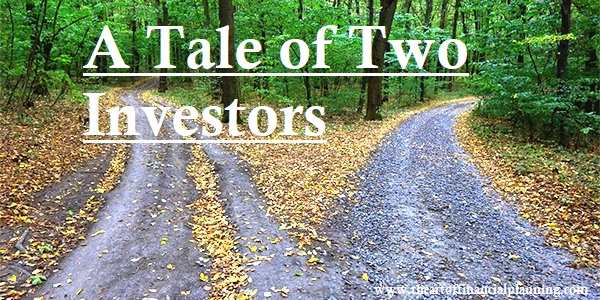
The bull market’s over and we are now in bear country after stocks dropped over 20% below February’s record high.1
The last time markets fell like this was during the financial crisis.
It is officially gut check time.
So, I’d like to tell you a story about two investors who lived through a bear market and how their decisions during the correction affected their lives ever after.
(Don’t like stories? Scroll down to the end for my specific advice.)
One investor, we’ll call her Pandora, was looking forward to her retirement when markets fell. She watched as her 401(k) lost 10%, 15%, and even more in a few short weeks.
After getting used to years of gains, she felt as though all her hopes for a comfortable future were evaporating right in front of her. She saw footage of trading floors in full-on panic and listened to the “experts” talk about the end of the world as she knew it.
Watching her portfolio fall, losing the value it had gained in the market’s record-breaking run was too much for her.
So, she logged into her account and entered the sell order, cashing out to avoid losing any more.
“I’ll reinvest when the panic’s over,” she told herself. “Selling is the best way to protect myself.”
So she waited and waited, and by the time she felt safe enough to get off the sidelines and back into the market, the bottom was long past, and she’d missed some of the best market days in a decade.
Pandora became one of the cautionary tales of investors who had to defer their retirement for years because they gave in to fear and made emotional decisions.
Athena was already retired when the bear market hit. Even though the headlines made her anxious, and she felt like the sky was falling, she stuck to the strategy she and her adviser created.
“We planned for this,” she’d remind herself when the worries would hit. “Selling is the worst thing I can do right now.”
She remembered that emotional decisions are usually bad ones and that trying to time the market by jumping in and out doesn’t end well.
So, she held on while her portfolio value seesawed and dropped 10%, 15%, and even more….and then finally started rising again months later once markets hit bottom and investor sentiment became positive again.
Athena’s portfolio grew during the recovery, helped along by the tactical investments her adviser recommended.
She postponed some major purchases to reduce the income she needed to take, but didn’t let markets cramp her style. She focused on living well and enjoying her retirement.
Both Pandora and Athena had their life savings on the line. Both of them worried about their portfolio, their retirement, and their financial future.
What do you think made a difference in their outcomes?
Athena trusted the process and stuck to her strategy. She didn’t let the market panic override her good sense.
Don’t be a Pandora. Be an Athena.
So, on to some specific advice.
The World Health Organization officially declared COVID-19 a pandemic, and the “fear contagion” is spreading faster than the virus itself.2 Between the fear, containment efforts, and knock-on effects on consumer demand and business spending, the economic impact of the coronavirus may be far-reaching.
Could the outbreak trigger a recession? It’s very possible.
We don’t know what the next weeks and months will bring. But we do know that the fundamentals don’t change.
Reaping the rewards of long-term investing means taking the good days along with the bad.
Market bottoms don’t come with a signpost. There’s no one waving a flag saying, “the worst is over, come on back!”
The end of a bear market looks an awful lot like the middle, and investors who miss out on the ride back up tend to lose spectacularly. That’s because the best days and worst market days tend to cluster. Sit the bear market out, and you’re likely to miss out on the whole play.
We don’t know how long this bear market will last. But we do know that panicking and blowing up a carefully crafted strategy is the worst thing to do right now.
I’d like you to remember just three things:
- Bear markets are part of the stock investing landscape and we have to live through them to see the next bull market.
- You can’t enjoy the upside of the roller-coaster if you get off at the bottom.
- Relax.
.


